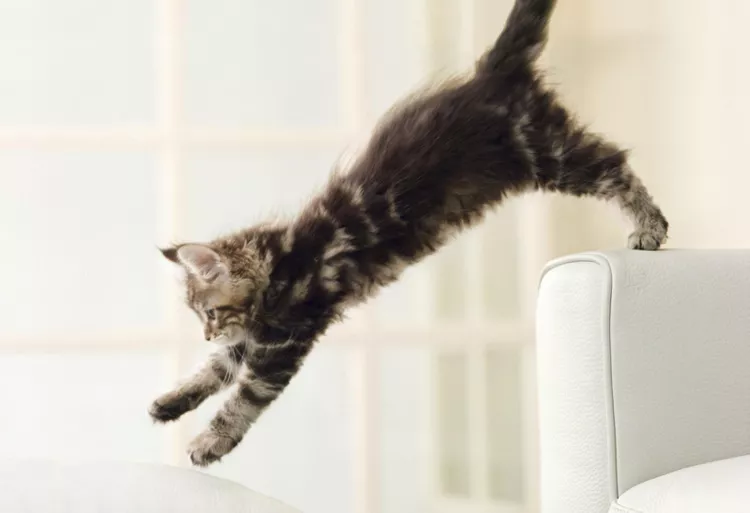
A cat acting crazy may run around the house or get a nightly burst of energy, complete with a chorus of meows. A "crazy" cat can be entertaining to watch, but the behavior could veer into destructiveness, with the cat inadvertently knocking things over, and an increased likelihood that someone gets bitten.
The cat may just be embracing its nocturnal or predatory instinct, in which case there are things you can do to support it and minimize the risk of chaos or bodily harm, or the wild behavior could also be a sign that something is wrong with their health.
No matter the breed, all cats have moments when they run across a room, meow like crazy, and act as if they're on a racetrack being chased. They dart about, faster and faster, looking all over the place, and then suddenly stop in their tracks.
This wild behavior is sometimes referred to as the "midnight crazies" when it happens at night. Your cat may entertain itself with wild activity or jump on your bed to paw at your feet, elbows, hair, or face to get you to join in the fun. The reasons for this wild and sometimes amusing behavior vary.
Cats are natural predators, and domestic cats retain this instinct to a certain extent. At times, a cat that's acting crazy may actually be exhibiting hunting behaviors, fighting maneuvers, or escape techniques.
A house cat that doesn't have to hunt for its food still needs to burn its pent-up energy, and it may be in the form of what appears to be crazy behavior. Toys, such as catnip mice, laser pointers, food puzzles, and feather wands encourage a cat to use its instincts to grab, chase, and jump. This exercise is especially important for your cat if it doesn't spend time outdoors.
Another reason for your cat’s crazy behavior could be that some cats are nocturnal and become more active at night. If a cat isn't getting enough exercise during the day, it may act especially crazy.
Many domestic cats spend their days alone indoors while their people are at work. When the cat's person comes home in the evening, the cat may be very active and want to play. If it has no outlet for all this energy, the cat may exhibit some crazy behavior. Kittens are especially energetic.
If you have an older cat, it may be acting crazy because of some cognitive dysfunction or senility. As a pet ages, its brain may start functioning differently and cause it to exhibit strange behavior for no apparent reason.
Sometimes a cat acts crazy and looks as if something is biting it sporadically because it has fleas. Particularly when meowing is involved, your cat could be hypersensitive to flea bites or simply have an itch in a place it can't reach.
If you suspect your cat has fleas, treat all the furry animals in the household with a prescription product specifically for cats, designed to kill and prevent fleas. You should also see your vet to determine if there are any secondary skin infections or allergies from the fleas that need to be treated. You'll also need to treat the environment by vacuuming, doing laundry, and using area sprays or flea bombs if recommended by your vet. Once the fleas are gone, your cat should stop this behavior.
Feline hyperesthesia syndrome (FHS) is a rare reason why a cat may act crazy, although it affects mature cats most often and the cause is unknown.
Discuss the possibility of FHS with your veterinarian if you notice that:
Sometimes it's difficult to know exactly what caused your cat to go a little wild all of a sudden. Frankly, cats are hard to interpret! Many people understand basic dog vocalizations and behaviors but don't recognize basic cat behaviors.
Dogs have expressive faces and body language that's pretty easy to accurately interpret. They wag their tails, make different noises to alert others of their moods, and often follow basic commands to please their people. Cats, on the other hand, are usually known more for their emotional vagueness and standoffish behavior. There is, however, a growing belief that cats are just as expressive as dogs. The problem is that people simply misunderstand or don’t see what or how their cats are trying to communicate.
When it comes to cats, meows and tail waves can mean a number of different things, depending on the situation. With each purr, yowl, or even blink, your feline is actually trying to communicate with you. The problem is figuring out what it's saying.
Experts say there’s something to gain from these attempts at communication. For instance, learning to read your cat's body language can strengthen your bond with it and allow you to become more effective at responding appropriately to its needs.
Every cat is different, so the best thing you can do to start is to simply observe your cat. Take mental notes of the environment and conditions present when the "crazy" behavior occurs. Pay attention to body language, vocalizations, time of day, and what your cat just did. Did your kitty just eat, groom, or scratch its back? Was there a playful meow before your cat dashed into the other room?
With time and careful observation, you'll likely begin to piece together the triggers of your cat's craziness in various situations. This will help you to understand what's normal for your cat and when any unusual behavior could be a symptom of a medical issue worth investigating with your vet.

Cute Pictures & Facts About Calico Cats & Kittens
Learn fascinating facts about calico cats, including photos, the genetics behind this color combination, and common folklore and traditions.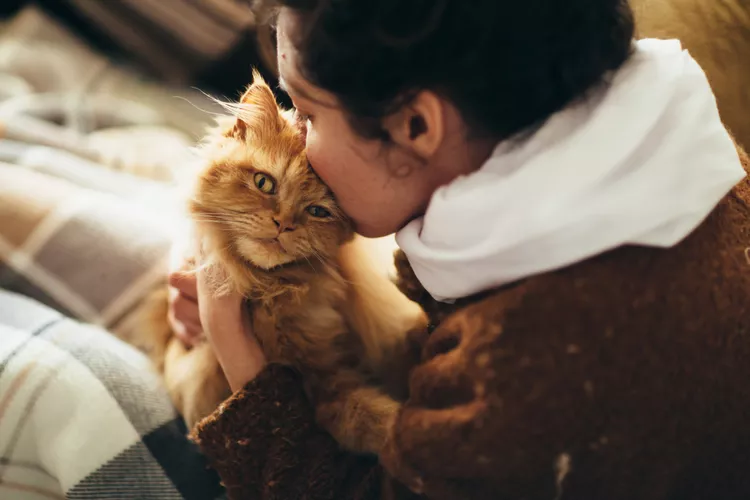
How to Prevent Cat Separation Anxiety During Vacations
Discover why cats develop litter box problems and cat behavior problems when you go on vacation and what you can do about it to help them.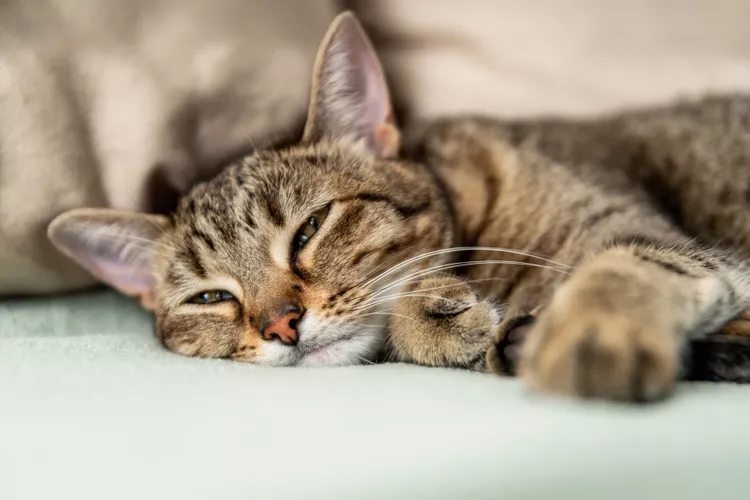
Cat Behavior Changes That Might Mean Something's Wrong
Cats' behavioral changes may indicate problems—or they may mean nothing at all. Explore causes of odd behavior and what to do about them.
Lhasa Apso: Dog Breed Characteristics & Care
The Lhasa apso is an ancient breed from Tibet that was bred to be a watchdog. Learn about its history, health, exercise needs, and more.
Reasons Why Dogs Run Away and How to Stop It
Dogs can escape, especially if they’re bored and not properly contained. Here are some techniques for stopping your dog from running away.
Can Dogs Get Depression? How to Help Your Sad Dog
Can dogs get depression? Learn about the signs of depression in dogs and find out how to help your sad dog.
How to Stop Aggression in Dogs
Dog aggression can be a serious behavior issue for pet owners. Learn how to stop aggression in dogs before someone gets hurt.
How to Stop Your Dog From Growling
A growling dog can soon become even more aggressive. Reduce the noise and potential for a dangerous situation with some of these techniques.
Why Do Dogs Dig Holes? How to Stop Your Dog from Relandscaping Your Yard
Dogs have been digging holes for centuries and for many reasons. Whether they’re bored or want to cool off in the dirt, here are the top reasons why dogs dig holes.
Dog Treat Varieties
Learn about the different types of dog treats on the market and decide which are best for your dog.
Can Dogs Eat Asparagus?
Dogs can eat asparagus, provided the vegetable is cooked plain and cut up for them. Seasonings, salt, and butter make it unhealthy for dogs.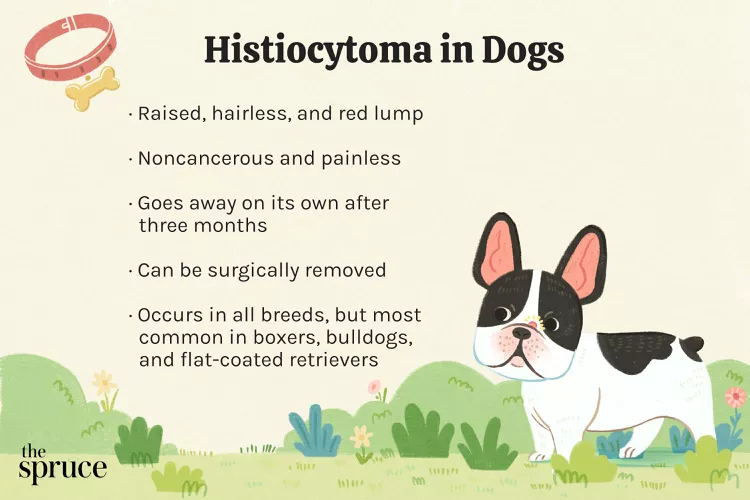
Histiocytomas in Dogs
A histiocytoma is a type of benign (non-cancerous) skin lump that usually affects young dogs. Learn the causes, treatment, and prevention.
Why Is My Dog’s Eye Swollen?
If your dog's eye is swollen, she may need veterinary attention. The inflammation could be caused by allergies, an injury, or even a tumor.
Common Bugs and Parasites Found on and Inside Dogs
Learn about common types of parasites in dogs. Find out how to treat and prevent parasites to keep your dog, your family, and yourself safe.
Exploring the Different Types of Pet-Friendly Beaches
Are you looking for pet-friendly beaches? Learn about the different types of pet-friendly beaches, their locations, and tips for visiting them with your pet.
10 Obscure, Little-known Canine Facts in Honor of National Dog Day
With National Dog Day upon us, it's time to celebrate everything about our favorite pets—even the weirder stuff. Here are 10 obscure facts about dogs you probably didn't know.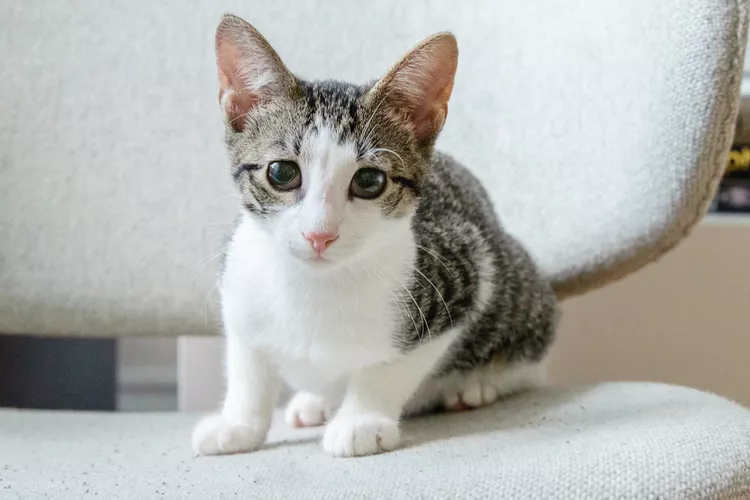
Kitten Development From 3 to 6 Months Old
Kittens grow and change a lot during their first year. Find out what happens between the ages of three months and six months old.
95 Siamese Cat Names
Our list of Siamese cat names has diverse and fun options to help you choose the ideal moniker for your elegant and lovable feline companion.
What to Buy for Your New Cat: A List of Essentials
Before you bring your new cat or kitten home, there are a number of things to collect or buy so your cat will feel welcomed like a family member.
The 6 Best Cat Nail Clippers of 2024 for a Safe Trim
Clipping your cat's nails can save your furniture and keep your kitty comfortable. We asked veterinarians for their cat nail clipper recommendations.